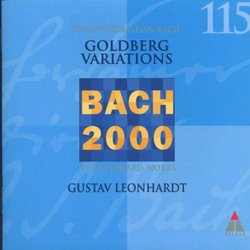| All Artists: Bach, Leonhardt Title: Goldberg Variations: Bach 2000 Members Wishing: 0 Total Copies: 0 Label: Elektra / Wea Release Date: 10/2/2001 Album Type: Original recording reissued, Original recording remastered Genre: Classical Styles: Chamber Music, Historical Periods, Baroque (c.1600-1750), Classical (c.1770-1830) Number of Discs: 1 SwapaCD Credits: 1 UPC: 685738114320 |
Search - Bach, Leonhardt :: Goldberg Variations: Bach 2000
 | Bach, Leonhardt Goldberg Variations: Bach 2000 Genre: Classical
|
Larger Image |
CD Details |
CD ReviewsMusic for the Insomniac? Gontroppo | Bathurst, NSW Australia | 05/17/2003 (5 out of 5 stars) "This was one of the pleasant surprises I received when I lashed out and bought the Bach 2000 set. Originally titled "Keyboard Practice, consisting of an Aria with Diverse Variations, for the Harpsichord with 2 Manuals," the work got this title for Count von Keyserlingk, who requested some clavier pieces for his resident harpsichordist, Johann Goldberg, to play whenever he couldn't sleep. He wanted something gentle, but lively and cheering. I think that he got his desire. The Count never tired of hearing them, and presented Bach with a golden goblet, filled with a hundred louis d'ors for his pains. Leonhardt plays these pieces in a lively and engaging manner. I have not heard other performances yet, but I hope one day to be able to compare this performance with Glenn Gould's and Andras Schiff's. But I am confident you will not be disappointed by the performance, even if you are not partial to the sound of the harpsichord." Gustav Leonhardt Plays the Goldberg Variations Robin Friedman | Washington, D.C. United States | 08/08/2005 (5 out of 5 stars) "Bach's Goldberg Variations BWV 988 are at the summit of his creative efforts and are among the greatest of all writings for the keyboard. Only Beethoven's Diabelli Variations are in the same category. The Goldbergs probably were composed in 1741 and consist of a stately 32-measure sarabande, which Bach had used in an earlier work, followed by thirty variations and concluding with a return of the original theme. The work is carefully structured with each third variation, except the last, in the form of a canon. The work is in two equal parts, with the second part beginning with variation 16 marked "Overture". Many listeners have tried to discover some extra-musical structure in the work. The work shows in an astonishing way how discipline, learning, and deep structure can produce music of total freedom, variety, and elevation.
I have always preferred this music on the harpsichord. I grew up with Wanda Landowska's pioneering rendition which for all the twanging sound of her instrument and her romantically influenced conception of the music remains a model for me. This version of the Goldbergs by the great Dutch harpsichordist, conductor, and student of early music Gustav Leonhardt dates from 1965. It was the second of Leonhard's three recordings of the Goldbergs. This recording is available in the series of 153 CDs of Bach's complete works offered under the title "Bach 2000". Until recently, it has also been available as a separate disk at a modest price. This recording was among the first of the Goldbergs on a period instrument. Leonhardt performs on a double-manual harpsichord build in 1962 modeled upon a harpsichord built in Antwerp in 1743. Each individual harpsichord has its own temper and sound. The instrument here is bell-like, clear, and crystalline. The linear, swaying, queenly character of the instrument helped me fall in love again with the Goldbergs. Timings of the Goldbergs vary substantially depending on the extent to which the repeats are observed. Leonhardt does not take the repeats, resulting in a performance of under 48 minutes. But his tempos are slow, deliberate and thoughtful. He allows the listener to hear the variety of counterpoint Bach used in this monumental composition and the variety of feelings and moods all based upon the underlying theme. He plays with restraint and with an idiomatic baroque style. The opening theme is played with seriousness and solemnity, and Leonhardt captures well the three minor-key variations as well as the concluding "Qodlibet", variation 30, based upon a popular song. Leonhardt's playing accentuates the beautiful sound of his instrument. There are many outstanding recordings of the Goldbergs, and I would urge the new listener to hear this music on the harpsichord. This recording by a modern master of the instrument makes an excellent introduction to an inspired and justly revered work. Robin Friedman" |

 Track Listings (32) - Disc #1
Track Listings (32) - Disc #1